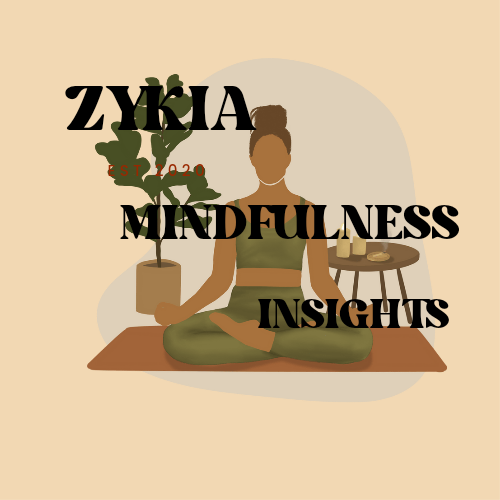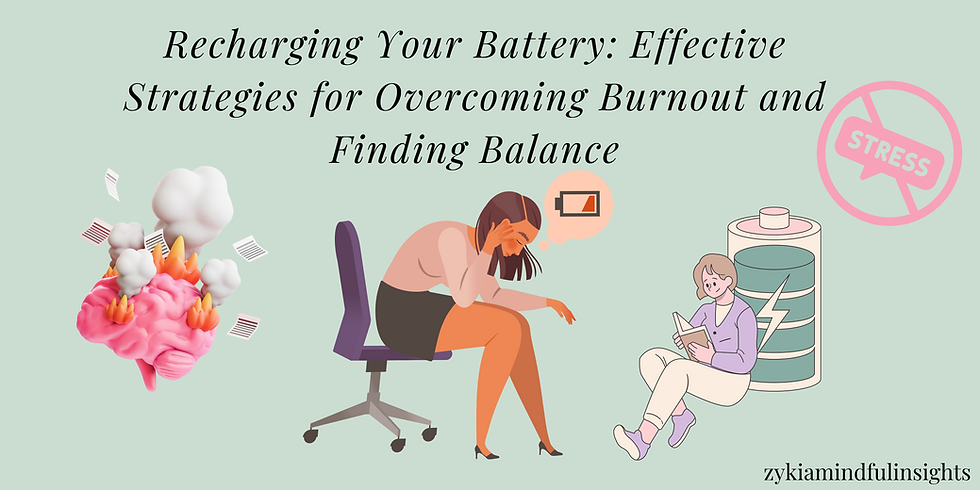Exploring the Benefits of Aromatherapy for Mental Well-Being
- Zykia Hannah

- Feb 20, 2024
- 6 min read
Ancient traditions have long valued aromatherapy, and in the contemporary wellness landscape, it has gained widespread acclaim for its multifaceted advantages. Let's embark on a journey into the realm of aromatherapy and discover how it can elevate your mental and physical health.
Discovering the transformative effects of aromatherapy on mental well-being is akin to embarking on a sensorial journey, one where the therapeutic scent of essential oils guides us to a state of emotional balance and inner tranquillity.
Definition of Aromatherapy
Aromatherapy adopts a holistic stance, harnessing the power of essential oils extracted from plants to foster health and wellness. These oils, sourced through processes such as steam, distillation, encapsulate the concentrated essence of the plant, providing a natural and healing avenue to augment different facets of existence.

Aromatherapy is a form of holistic healing that uses natural plant extracts to promote health and well-being. When used for mental well-being, it can offer various benefits:
Stress Reduction: Certain essential oils, like lavender and chamomile, are known for their calming properties. Inhaling these oils can help reduce stress and anxiety levels, promoting relaxation and improved mental clarity.
Improved Sleep: Essential oils like lavender, chamomile, and sandalwood are often used to promote restful sleep. Inhaling these oils before bedtime or using them in a diffuser can help improve sleep quality and reduce insomnia.
Mood Enhancement: Aromatherapy can help uplift and stabilize mood. Essential oils like citrus oils (e.g., lemon, orange) and peppermint are known for their invigorating and mood-boosting properties.
Improved Cognitive Function: Some essential oils, like rosemary and peppermint, have been shown to improve cognitive function and mental alertness. Inhaling these oils or using them in a diffuser can help improve focus and concentration.
Pain Relief: Certain essential oils, like eucalyptus and peppermint, have analgesic properties that can help relieve headaches, muscle tension, and other types of pain.
Boosted Immune System: Essential oils like tea tree and eucalyptus have antimicrobial properties that can help strengthen the immune system and prevent illnesses.
Reduced Symptoms of Depression and Anxiety: Several studies have shown that aromatherapy can help reduce symptoms of depression and anxiety, especially when combined with other therapies like massage or psychotherapy.
Aromatherapy as Complementary Therapy: Aromatherapy is often used as a complementary therapy alongside other treatments for mental health conditions like depression, anxiety, and PTSD.
Personalized Treatment: Aromatherapy can be personalized to individual preferences and needs. You can blend different essential oils to create a custom scent that promotes mental well-being.
Promotes Mindfulness: Using aromatherapy encourages mindfulness and can help create a calm and peaceful environment, which is beneficial for mental well-being.
It's important to note that while aromatherapy can be beneficial for mental well-being, it should not replace professional medical treatment or therapy for mental health conditions. It's also essential to use essential oils safely, as they can be potent and may cause allergic reactions in some individuals. Always dilute essential oils properly and avoid using them on the skin without carrier oil.
Aromatherapy, the use of essential oils from aromatic plants, has long been recognized for its potential to promote mental well-being. The sense of smell is a powerful sense that is deeply connected to our emotions and memories. When we inhale the aroma of essential oils, the molecules interact with the olfactory system and are sent directly to the brain's limbic system, the center of emotions and memory. This can trigger emotional responses and influence our mood and mental state.
One of the primary benefits of aromatherapy for mental well-being is stress reduction. Several essential oils, such as lavender, chamomile, and bergamot, are known for their calming and stress-relieving properties. Inhaling these oils through a diffuser or by applying them to pulse points can help relax the mind and body, reduce anxiety, and promote a sense of peace and tranquility.
Aromatherapy can also be beneficial for improving sleep quality. Essential oils like lavender and chamomile have sedative properties that can help induce relaxation and promote restful sleep. Diffusing these oils in the bedroom or adding a few drops to a warm bath before bedtime can create a soothing environment that encourages a deeper and more restorative sleep.
Furthermore, aromatherapy can help boost mood and enhance emotional well-being. Citrus oils like lemon, orange, and grapefruit are known for their uplifting and energizing effects. Inhaling these oils can help increase alertness, promote feelings of happiness, and combat feelings of sadness or depression. Similarly, floral oils like rose, jasmine, are often used to promote relaxation and emotional balance.
In addition to its direct effects on mood, aromatherapy can also support mental well-being by reducing symptoms of anxiety and depression. Several studies have shown that inhaling certain essential oils can help alleviate symptoms of anxiety, such as nervousness, restlessness, and excessive worry. Similarly, some essential oils, like bergamot and geranium, have been found to have antidepressant effects, helping to improve mood and reduce feelings of sadness and despair.
Overall, aromatherapy can be a valuable tool for promoting mental well-being. Whether it's through stress reduction, improved sleep quality, enhanced mood, or reduced symptoms of anxiety and depression, the therapeutic effects of essential oils can provide a natural and holistic approach to supporting mental health and emotional well-being.
Understanding Essential Oils
Introduction to Essential Oils
Essential oils are volatile, concentrated liquids derived from plants, capturing the aroma and essence of a plant's natural fragrance. They are extracted through various methods, including distillation, expression, or solvent extraction. Each essential oil possesses unique therapeutic properties that can benefit physical and mental well-being.
Types of Essential Oils
Essential oils can be categorized into different types based on their chemical composition and therapeutic properties. These include:
Citrus oils (e.g., lemon, orange): Known for their uplifting and invigorating properties.
Floral oils (e.g., lavender, chamomile): Renowned for their calming and soothing effects.
Herbaceous oils (e.g., rosemary, peppermint): Valued for their stimulating and mental clarity-enhancing properties.
Woody oils (e.g., cedar-wood, sandalwood): Praised for their grounding and relaxing qualities.
Resinous oils (e.g., frankincense, myrrh): Revered for their meditative and spiritually uplifting properties.
Spicy oils (e.g., cinnamon, clove): Recognized for their warming and energizing characteristics.
How Essential Oils Work
Essential oils work through inhalation (aromatherapy), topical application, and in some cases, ingestion. When inhaled, the scent of essential oils stimulates the olfactory system, triggering emotional and physiological responses. When applied topically, they can be absorbed through the skin and enter the bloodstream, providing localized and systemic benefits. However, it's important to dilute essential oils properly and use caution, as some oils can cause skin irritation or sensitization.
Benefits of Essential Oils for Mental Well-being
Stress Reduction: Certain essential oils, like lavender and chamomile, are known for their calming properties and can help reduce stress and anxiety.
Mood Enhancement: Aromatherapy can uplift and stabilize mood. Essential oils like citrus oils and peppermint are known for their invigorating and mood-boosting properties.
Improved Sleep: Essential oils like lavender, chamomile, and sandalwood are often used to promote restful sleep and reduce insomnia.
Improved Cognitive Function: Essential oils like rosemary and peppermint have been shown to improve cognitive function and mental alertness.
Reduced Symptoms of Depression and Anxiety: Several studies have shown that aromatherapy can help reduce symptoms of depression and anxiety.
Personalized Treatment: Aromatherapy can be personalized to individual preferences and needs, allowing for a custom blend of essential oils to be used.
Conclusion
Understanding essential oils and their benefits for mental well-being can provide individuals with a holistic approach to self-care and wellness. Incorporating essential oils into daily routines can promote relaxation, reduce stress, improve mood, and enhance overall mental health. However, it's important to use essential oils safely and consult with a qualified aromatherapist or healthcare professional before using them, especially if you have any underlying health conditions or are pregnant or breastfeeding.
"Exploring the benefits of aromatherapy for mental well-being allows us to tap into the power of nature's healing essences and find harmony between mind, body, and spirit."
In conclusion, aromatherapy is a multifaceted practice that has been valued across cultures and ages for its therapeutic effects on the mind and body. By exploring the vast array of essential oils and their individual benefits, we can tap into the natural healing power of plants to promote mental well-being, reduce stress, improve sleep quality, enhance mood, boost cognitive function, and alleviate symptoms of anxiety and depression. With proper knowledge and application, aromatherapy can become an integral part of a holistic approach to health and wellness, contributing to overall emotional balance and vitality.
🤍Quote of the day:
"Some days you just have to create your own sunshine" - Sam Sundquist




Comments